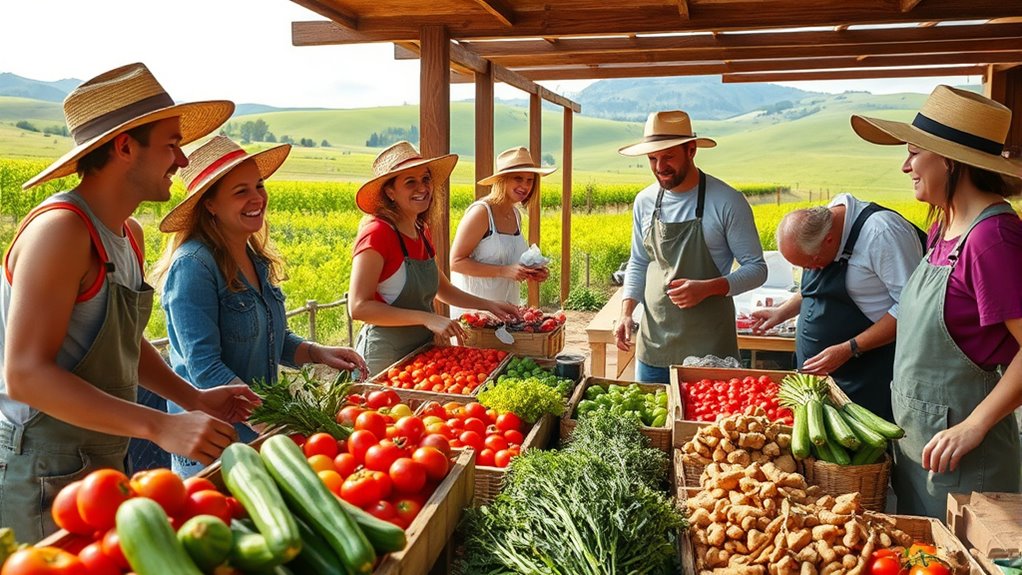To create successful collaborations with local farmers, start by researching those who share your values, like organic or sustainable practices. Build trust through honest communication, respecting cultural traditions, and establishing clear agreements. Focus on seasonal and diverse crops to guarantee year-round supply. Use technology to share data and strengthen bonds. Promote your partnership locally by highlighting benefits and organizing farm visits. Keep exploring how to deepen these connections to build stronger, mutually beneficial relationships.
Key Takeaways
- Build trust through honest communication, cultural respect, and regular farm visits to foster long-term relationships.
- Clearly define partnership terms, including delivery, quality standards, and payment to ensure mutual understanding.
- Engage in networking with farmers via digital tools and community events to strengthen collaboration.
- Promote local sourcing benefits through social media, farm visits, and storytelling to encourage community support.
- Utilize data sharing platforms and real-time communication to optimize supply chain efficiency and responsiveness.
Identifying Local Farmers Who Align With Your Values
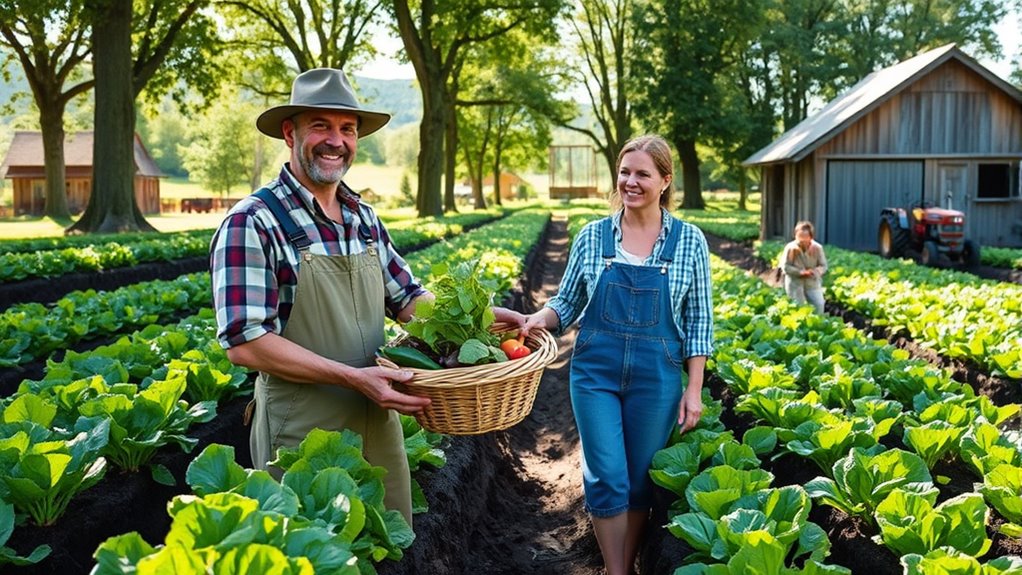
To successfully collaborate with local farmers, you need to find those whose values align with your goals. Start by researching farmers with relevant certifications, such as organic or sustainable farming credentials, which reflect their commitment to eco-friendly practices. Pay attention to their crop rotation methods, ensuring they prioritize soil health and productivity without harmful chemicals. Connect with farmers who emphasize environmental responsibility and long-term sustainability, as these shared values lay a solid foundation for partnership. Visiting farms and asking about their certifications and crop management strategies helps you gauge their commitment to responsible agriculture. By identifying farmers who prioritize these practices, you set the stage for meaningful collaboration rooted in mutual respect and aligned objectives. Understanding sustainable farming practices can further inform your selection process and ensure a mutually beneficial partnership. Incorporating eco-friendly materials into your collaboration efforts can strengthen your shared commitment to environmental stewardship.
Building Trust and Establishing Open Communication

Building trust starts with honest and transparent conversations, so make sure you communicate openly with farmers. Respect their cultural practices and listen carefully to their insights and concerns. When you foster this kind of dialogue, it creates a strong foundation for a successful partnership. Incorporating open communication strategies helps maintain clarity and mutual understanding throughout your collaboration. Additionally, understanding retail hours can be beneficial when planning visits to suppliers or coordinating deliveries, ensuring smooth operations for both parties. Being aware of the local market trends can also help align your goals and expectations effectively. Researching security zone information can further protect your partnership by understanding potential risks and safety protocols, which is essential when navigating challenges together.
Foster Transparent Dialogue
How can you foster transparent dialogue with local farmers? Start by visiting farmers’ markets regularly, showing genuine interest in their products and practices. Next, openly discuss certification standards to clarify expectations and assure shared understanding. Third, ask for feedback on your partnership approach, demonstrating your commitment to growth. Additionally, recognizing the importance of consistent communication helps maintain ongoing trust and collaboration. Establishing clear asset division procedures can further streamline the partnership process and prevent misunderstandings. Finally, be honest about your needs and constraints, encouraging farmers to voice concerns. Maintaining open communication helps build trust and aligns goals, making collaborations more effective. This transparency reassures farmers that you’re committed to mutual success, leading to stronger relationships and better-quality produce. By prioritizing honest conversations, you create a foundation of trust that benefits both your organization and local farmers. Incorporating sustainable practices into your collaboration can further enhance mutual benefits and environmental impact. Establishing trust-building strategies can also facilitate long-term partnerships and shared growth.
Respect Cultural Practices
Respecting cultural practices is essential for establishing trust with local farmers. When you show cultural sensitivity, you demonstrate respect for their traditional practices, fostering openness and collaboration. Understanding local customs helps prevent misunderstandings and builds a foundation of mutual respect. Engage actively by listening and observing, allowing farmers to share their ways of working. Use this table to grasp key cultural aspects:
| Cultural Practice | Significance | Do’s and Don’ts |
|---|---|---|
| Traditional ceremonies | Honor community values | Participate respectfully |
| Farming rituals | Maintain trust | Observe without interruption |
| Local festivals | Strengthen bonds | Attend with genuine interest |
| Religious beliefs | Show respect | Avoid sensitive topics |
Being aware of cultural diversity can further enhance your approach and demonstrate genuine appreciation of their identity. Recognizing the importance of cultural practices can also foster stronger relationships and promote mutual understanding. Additionally, understanding how health practices influence farming routines can help in building more effective partnerships. Developing cultural competency is crucial for meaningful engagement with local communities. Moreover, acknowledging traditional knowledge can lead to more sustainable and respectful collaborations.
Negotiating Fair and Transparent Agreements
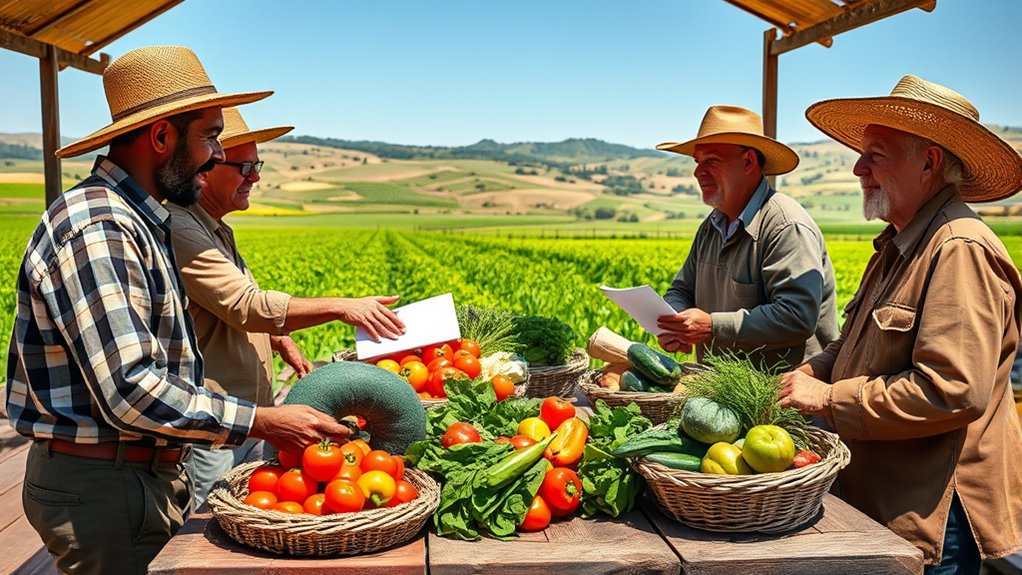
Negotiating fair and transparent agreements is essential to establishing trust and ensuring mutually beneficial relationships with local farmers. To do this effectively, focus on clear contract negotiation and fair pricing strategies. Here are four tips:
Building trust with farmers requires clear, fair contracts and open communication.
- Define clear terms upfront, including delivery schedules, quality standards, and payment deadlines.
- Use transparent pricing strategies that reflect market rates and farm costs to ensure fairness.
- Be open to discussions—listen to the farmer’s concerns and adapt terms when necessary.
- Put everything in writing to prevent misunderstandings and provide a reference. Additionally, incorporating wall organization systems can help in managing records and documentation related to agreements efficiently. Proper record-keeping promotes consistent communication and accountability throughout the partnership.
Implementing these practices can also help in complying with relevant alimony laws and avoiding potential disputes, fostering a sustainable and respectful partnership.
Collaborating on Seasonal and Unique Offerings
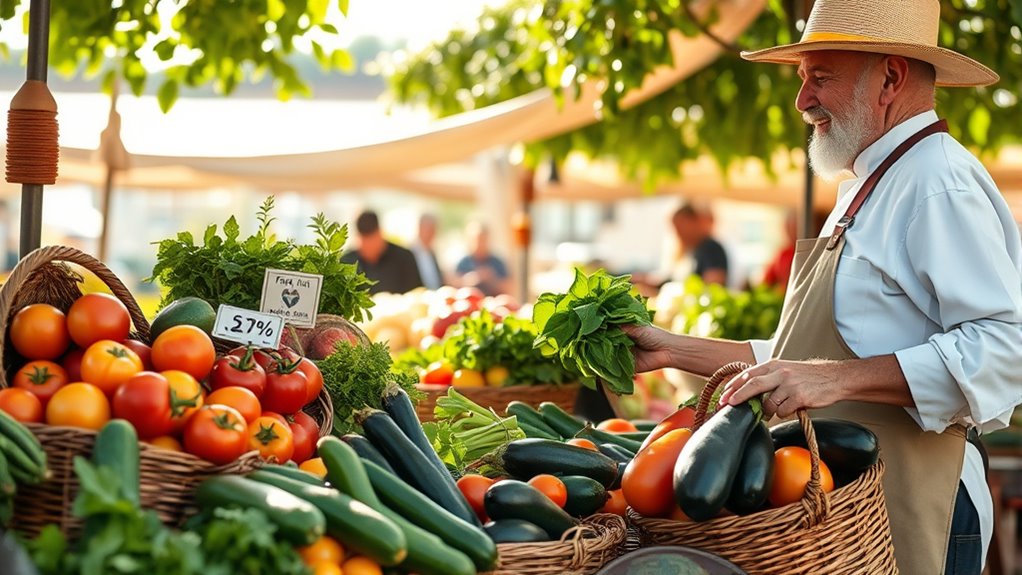
Building on fair agreements, collaborating with local farmers to develop seasonal and unique offerings can boost your business and strengthen partnerships. Focus on seasonal menu planning to highlight fresh, locally available ingredients, which appeals to customers seeking variety and quality. Work with farmers to identify peak harvest times and create dishes that showcase those ingredients, giving your menu a dynamic edge. Incorporate crop diversity strategies by encouraging farmers to grow a variety of crops, ensuring a steady supply of different products throughout the year. This approach not only enriches your menu but also demonstrates your commitment to sustainability and supporting local agriculture. Emphasizing networking with farmers allows for better communication and a stronger relationship, leading to more successful collaborations. Building a resilient supply chain through crop rotation can also help mitigate risks associated with seasonal fluctuations, ensuring consistent availability of key ingredients. Additionally, understanding tax implications can help optimize your financial planning when establishing these partnerships. Engaging in crop rotation practices further enhances soil health and productivity, benefiting both farmers and your menu offerings.
Leveraging Technology to Strengthen Partnerships
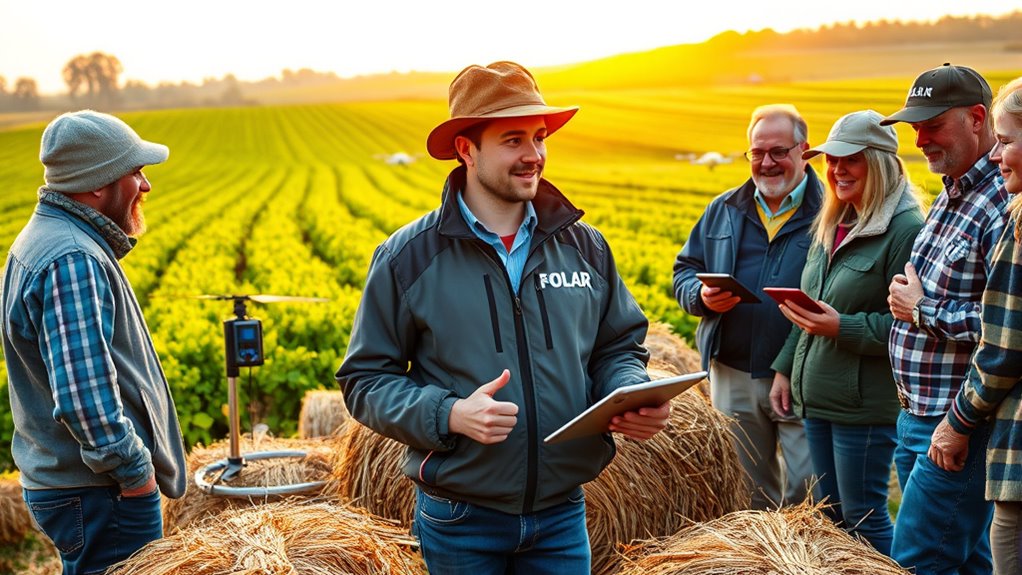
Using digital communication tools makes it easier to stay connected with local farmers and coordinate efforts quickly. Data sharing platforms allow you to exchange information on crop schedules, inventory, and weather patterns, improving planning and responsiveness. By embracing these technologies, you can build stronger, more efficient partnerships that benefit everyone involved.
Digital Communication Tools
Digital communication tools have transformed how farmers and partners connect, making collaboration more immediate and efficient. These tools enable real-time engagement and foster stronger relationships. For example, you can:
- Use virtual tours to showcase farm operations, allowing partners to explore remotely and ask questions directly.
- Conduct online surveys to gather feedback on products, services, or collaboration ideas quickly.
- Share updates instantly through messaging apps or email, keeping everyone informed and aligned.
- Schedule virtual meetings to discuss plans, resolve issues, and brainstorm without the need for in-person visits.
Data Sharing Platforms
Data sharing platforms are transforming how farmers and partners collaborate by enabling seamless exchange of essential information. These platforms allow you to share data securely, with built-in safeguards to protect data privacy. This guarantees sensitive information remains confidential while fostering transparency. By leveraging data analysis tools within these platforms, you can identify trends, optimize crop yields, and improve resource management. Sharing real-time data helps both farmers and partners make informed decisions quickly, strengthening your collaboration. However, it’s crucial to establish clear protocols for data privacy and access controls to prevent misuse. When used effectively, data sharing platforms streamline communication, enhance trust, and create a more efficient partnership that benefits everyone involved.
Promoting Local Sourcing to Your Community
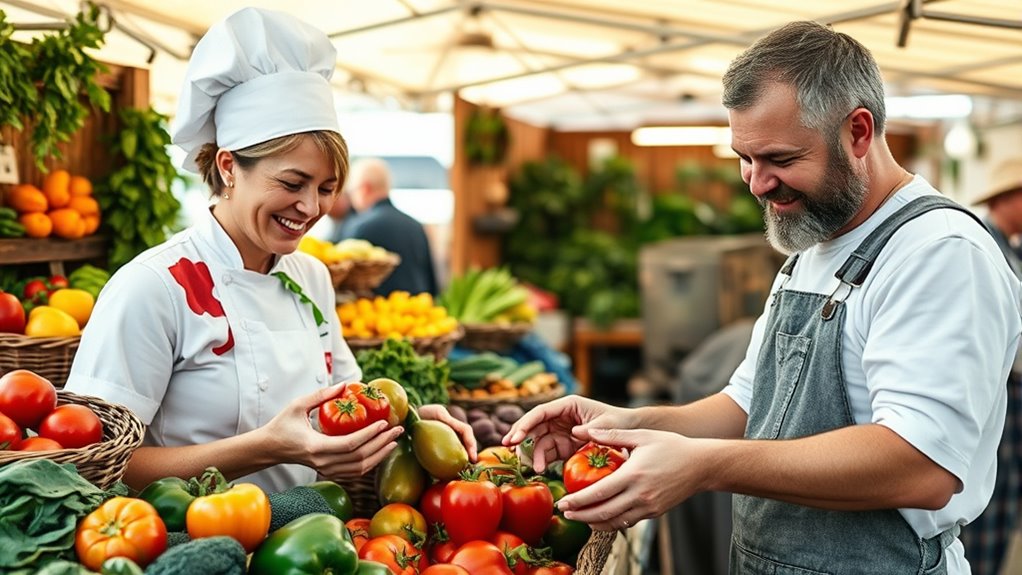
Promoting local sourcing to your community begins with highlighting the tangible benefits it offers. Emphasize how farm-to-table practices support local farmers and reduce environmental impact. To effectively spread the word, consider these strategies:
- Share success stories of community supported agriculture (CSA) programs that showcase fresh, local produce.
- Host farm visits or tasting events to connect consumers directly with farmers.
- Use social media to highlight seasonal offerings and the benefits of supporting local agriculture.
- Collaborate with local media to feature stories about the importance of farm-to-table initiatives.
Frequently Asked Questions
How Can I Find New Local Farmers Outside My Network?
To find new local farmers outside your network, start by attending community events like farmers markets and agricultural fairs. Engage with farmers directly and ask about their practices. Use social media platforms to search for local farms and join relevant groups or pages. Posting your interest in collaboration can attract farmers interested in partnership. Building relationships through these channels helps you discover new local farmers and establish meaningful collaborations.
What Are Common Challenges Faced in Farmer Collaborations?
When you collaborate with farmers, trust issues often arise, making it hard to build strong relationships. Resource sharing can also be a challenge, as both parties might hesitate to exchange valuable assets or knowledge. These hurdles can slow progress and cause misunderstandings. To overcome them, focus on open communication and establishing clear agreements, which help foster trust and guarantee fair resource sharing, paving the way for successful collaborations.
How Do I Ensure Long-Term Sustainability in Partnerships?
To guarantee long-term sustainability, focus on fostering community engagement and open communication. Keep partners involved in decision-making and share resources fairly to build trust. Regularly evaluate the partnership’s progress and adapt strategies as needed. By maintaining transparency and mutual support, you create a strong foundation that encourages ongoing collaboration, resilience, and growth over time. This approach helps sustain the partnership and benefits everyone involved.
What Legal Considerations Should I Be Aware of in Agreements?
Think of legal agreements as the backbone of your partnerships. You should carefully review contract clauses to guarantee they clearly define roles, responsibilities, and payment terms. Don’t overlook liability agreements, which protect you from unforeseen risks. Always consult with a legal professional to avoid walking into a minefield. Being thorough now saves you from headaches later, helping your collaboration stay on solid ground for the long haul.
How Can I Measure the Success of Collaborations?
To measure the success of your collaboration, focus on partnership metrics like sales growth, product quality, and community reach. Use feedback methods such as surveys, interviews, and regular check-ins to gather insights from all partners. By tracking these metrics and listening to feedback, you can identify strengths and areas for improvement, ensuring your collaboration remains effective and mutually beneficial over time.
Conclusion
By forming genuine partnerships with local farmers, you can create unique, fresh offerings that resonate with your community. For instance, imagine partnering with a nearby orchard to feature seasonal apples in your menu, attracting more customers and supporting local agriculture. Building trust and communicating openly will guarantee these collaborations thrive. When you prioritize local sourcing, you not only enhance your offerings but also strengthen your community’s economy and sense of connection.
